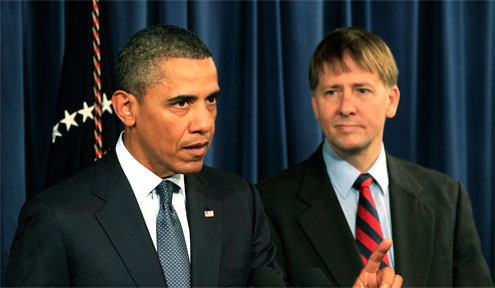Justice Department backs president on recent recess appointments
Office of Legal Counsel says pro forma Senate sessions do not interrupt recesses.

Kevin Lamarque/Newscom
This story has been updated with additional comment.
The Justice Department's Office of Legal Counsel has backed President Obama in affirming the president's authority to make recess appointments during pro forma sessions of the Senate.
Obama infuriated many Republicans early this month when he named Richard Cordray as the first director of the controversial Consumer Financial Protection Bureau and on the same day filled three vacancies on the National Labor Relations Board, while most senators were out of town.
Critics charged that the action showed contempt for Congress and might be illegal -- some business groups affected by regulations under the new bureau threated to take the case to court.
In a Jan. 6 memo to the counsel to the president, Assistant Attorney General Virginia Seitz wrote, "the convening of periodic pro forma sessions in which no business is to be conducted does not have the legal effect of interrupting an intrasession recess otherwise long enough to qualify as a 'Recess of the Senate' under the Recess Appointments Clause.
"In this context," she said, "the president therefore has discretion to conclude that the Senate is unavailable to perform its advise-and-consent function and to exercise his power to make recess appointments."
The Justice Department posted the document Thursday.
The memo notes that pro forma sessions in which Senators aim to prevent recess appointments by having a single member enter the chamber every three days to gavel the chamber into session have been going on since 2007. In making its case, the memo cites guidance issued during the George W. Bush administration, when Alberto Gonzalez was attorney general.
More recently, senators' actions have been "forced by the House," the new memo says, noting that some coordinated their statements on the subject with House members' plans, referencing the Constitution's requirement that neither chamber can adjourn for more than three days without consent of the other.
"Although the Senate will have held pro forma sessions regularly from Jan. 3 through Jan. 23, in our judgment, those sessions do not interrupt the intrasession recess in a manner that would preclude the resident from determining that the Senate remains unavailable throughout to `receive communications from the president or participate as a body in making appointments.' "
After reviewing examples of recent Senate scheduling orders, the Seitz memo said, "The scheduling order under which the pro forma sessions are held during this recess expressly provides that there is to be `no business conducted.'
"In our judgment, the president may properly rely on the public pronouncements of the Senate that it will not conduct business (including action on nominations), in determining whether the Senate remains in recess.
"Moreover, even absent a Senate pronouncement that it will not conduct business, there may be circumstances in which the president could properly conclude that the body is not available to provide advice and consent for a sufficient period to support the use of his recess appointment power," she wrote.
After considering the opinions of the attorney general, the Office of Legal Counsel, historical practice and "the limited judicial authority" that exists, the office said, "we conclude that while Congress can prevent the president from making any recess appointments by remaining continuously in session and available to receive and act on nominations, it cannot do so by conducting pro forma sessions during a recess."
Noting that the U.S. Supreme Court has not ruled on the question, the memo said officials cannot predict how courts will react.
Sen. Chuck Grassley, R-Iowa, ranking member of the Judiciary Committee, suggested the courts would disagree with the memo, which he described as "unconvincing" and at odds with the administration's own statements.
"It fundamentally alters the careful separation of powers between the executive and legislative branches that the framers crafted in the Constitution," he said. "It relies on no Supreme Court decision and many conclusions are unsupported in law or the Constitution." Grassley described the opinion as an escalation of the Obama administration's "pattern of contempt" for elected officials. "It flies in the face of more than 90 years of historical practice," he said. "The Senate will need to take action to check and balance President Obama's blatant attempt to circumvent the Senate and the Constitution."







